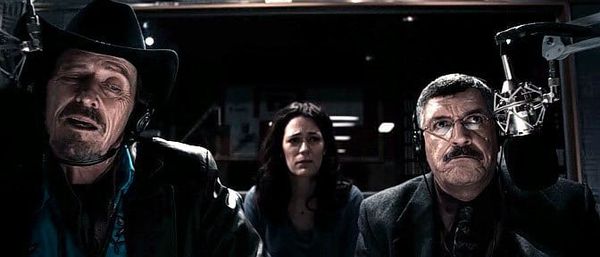Eye For Film >> Movies >> Pontypool (2008) Film Review
Pontypool
Reviewed by: Sarah Artt

At the inaugural screening of Bruce McDonald's Pontypool at the 63rd Edinburgh International Film Festival, Ian Hoey, the manager of Edinburgh's Cameo Cinema intrepidly conducted a Q&A with the director that went on past midnight. McDonald, sporting a rakish white cowboy hat, had come to Edinburgh direct from the film's New York opening and jovially informed the audience: “I'm still drunk.” Sadly, the film's writer Tony Burgess (whose presence in New York was prevented due to a previous charge for armed robbery) was not able to come to Edinburgh.
Having optioned the film (based on Burgess' novel Pontypool Changes Everything) for the price of a two-dollar chocolate egg, McDonald was interested in making a zombie film that wasn't truly a zombie film - the instruction to the extras on set was apparently: “Your'e not zombies. You're conversationalists.” Inspired by George Romero and the punk rock, DIY sensibility of The Ramones, (Joey Ramone makes a cameo in McDonald's debut feature Roadkill), McDonald has often made films concerned with music. His early features (lamentably not available on DVD in the UK - distributors take note!) Roadkill, (1989) Highway 61 (1991) and Hard Core Logo (1996) all concern characters who are either musicians or directly involved with the music industry.

In the past, McDonald has made films where the supernatural is a tangential part of the narrative. For example, in Roadkill, Ramona (Valerie Buhagiar) appears to survive a shoot-out in a bar when she finally tracks down the wayward band, The Children Of Paradise, somewhere in rural Ontario; in Highway 61 the devil makes regular appearances as Mr Skin (Earl Pasko), dressed in a cheap suit with the distinct air of the used car salesman. Yet Pontypool is perhaps McDonald's first feature where the supernatural and the unexplained are a key part of the narrative. The premise is that a virus is passed through the English language and that only certain words are infected. When the infection takes hold, the hapless victims do take-on zombie-like qualities: dead-eyed, they press themselves against the sound-proof glass of Grant Mazzy's radio booth.
Grant Mazzy (McHattie) is the eccentric morning man for Radio 660, a small local station located in the town of Pontypool, Ontario. A talk radio maverick, he is consistently reigned in by his producer Sydney Briar (Houle) and “technical cowgirl” Laurel Ann (Reilly). Early on Valentine's Day, they begin to hear reports of a hostage situation at the fish hut. Initially, this is chalked up to the drunken celebrations accompanying the end of ice-fishing season. Reports are soon corroborated by Kevin the weather man in his ironically named “Sunshine Chopper” - let's remember this is rural Canada in Februrary where sunshine is at a premium. Sydney later confesses to Grant that the Sunshine Chopper is, in fact, Kevin's Dodge Dart from which he plays helicopter sound effects. We are told that he sits on top of a hill to provide his 'aerial view'. I can't really explain why this is so funny, except that this kind of thing would only happen in rural Ontario.
As reports of the riot worsen, the station receives a call from the BBC asking for confirmation as to whether “French Canadian riot police have been called in to crush this insurgency” and querying whether the incident is related to separatist terror groups. The context for this event in undoubtedly the activities of le Front de Libération du Quebec who in the 1960s and 1970s planted bombs and took hostages in an attempt to draw attention to the militant movement for Quebec sovereignty. If you've seen the masterful soon-to-be-classic Mesrine Part 1 at EIFF this year, you'll have have seen that one of Jacques Mésrine's compatriots during his exile in Montréal helped to finance the FLQ. The events described by the BBC reporter in Pontypool are in many ways an inversion of the events of the October 1973 crisis, which saw Canadian armed forces on the streets of Montréal in response to kidnapping of public officials by the FLQ.
I should perhaps explain that in Canada we have two official languages and the tension between English and French-speaking Canada is long-standing. Described in literary terms as the two solitudes, the speaking of French or English in Canada has always been controversial. Therefore, to make a film in which English is the forum for infection, while French and Armenian (the language spoken by the local doctor John Mendez (Alianak) - possibly a shout-out to fellow Canadian filmmaker Atom Egoyan?) remain 'safe' is a very interesting concept, particularly in the Canadian context. However, as English becomes more widely spoken around the world, the implication of words as virus is particularly intriguing.
As the 'conversationalists' begin to lay siege to the station, Grant, Sydney and John hole up in the radio booth, trying not to speak or breathe for fear of becoming infected. When they work out a way to disperse the hoard of zombies, it is in many ways a tribute to the inventiveness that often pervades radio as a medium. Because radio is now an old, established medium we tend to take it for granted. It has passed rather effortlessly onto the internet and into digital formats but in many ways the style of radio has shifted comparatively little - there are talk radio, music djs, news, sport - but as with all entertainment media, the growth of the niche market via digital broadcasting has increased.
In many ways, Pontypool is a film that is less about zombies and more about the excitement, immediacy and accessibility of making live radio, which is something that can still be done with relatively primitive equipment, and by a small number of people. When Grant rallies Sydney for one last attempt to rout the conversationalists, he does so by asking her: “Do we really wanna provide a genocide with elevator music?” McDonald has once more created a unique and entertaining film that will be appreciated by fans of the zombie film and the quirky comedy alike, and I urge you to seek out his earlier film work. In recent years, he has worked mostly in television, memorably directing episodes of Don McKellar's single season series Twitch City. I'd like to think McDonald's film work is deserving of a wider international market, so I hope his selection for this year's EIFF is a sign of greater recognition to come.
Reviewed on: 29 Jun 2009














